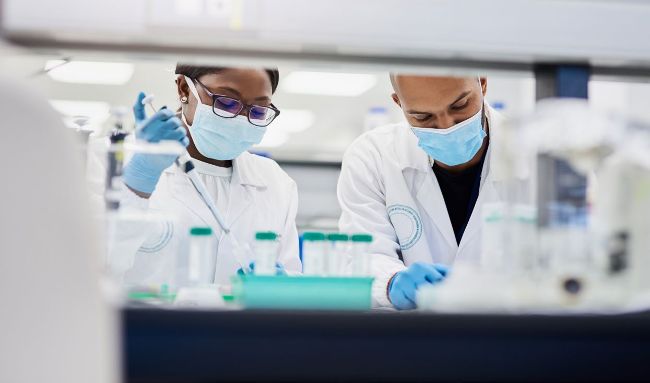How far is ‘too far’?
As the National Health Service celebrates its 75th anniversary this month, Jackie Macadam considers some of the ethical debates surrounding advances in medicine.

Jackie Macadam
IN the field of medicine, boundaries pushed are often cheered as research looks for cures or treatments for disease and medical conditions.
Many people will accept the methods used to get to that position; perhaps not liking, but looking past the research done on countless animals beforehand; the trials with human volunteers which are not always successful; the people given the ‘placebo’ drug who did not get the relief perhaps that others in randomised trials did.
It can be ethically murky, depending on your own point of view.
And that, in a nutshell, is the problem with ethics. They are somewhat subjective. That is why institutions and governing bodies in charge of scientific development, often try to guide their members; to provide an ethical structure they can use to help to push their research, but to keep it within generally acceptable boundaries.
“Every medical advance has come up against ethical considerations,” says the Rev Dr Mike Fuller, lecturer in Science and Religion at Edinburgh University. “Even organ transplants, that we consider normal nowadays, were controversial when they first began happening. And today, as we are starting to look at animal to human transplants, having first of all genetically engineered pigs to develop human compatible organs, we are facing that dilemma again. The key to medical ethics is they should be seen to preserve, enhance, and extend life.
“Genetic modifications are contentious because no gene works in isolation and if one part of the gene is altered by scientists, other unforeseen changes could occur,” he says, “And that’s one reason why we are very careful about modifications that could be carried on to the next generation. A scientist in China was jailed for inserting a gene conferring resistance to HIV into twin foetuses who went on to be born.
We don’t know the full effect such genetic manipulation may have, both on those children and on their offspring. But the children are born and will now grow up with these uncertainties.
“There are other ethical considerations around animal testing, and also economic arguments – the pros and cons of commercial interests. Is it really ethical, if there is a drug that can cure a dreadful disease, to keep it away from people who can’t afford it?
“For people who work in the field, the rules really are stringent. Whenever work that affects human beings is to be carried out, ethics committees will carefully consider the proposition beforehand, and legal issues will be argued. Ethical protocols will need to be held to very strictly where we try to think in advance all the possible problems that the proposed experiment could cause and each case is argued strenuously.
“We are not perfect, but there are measures in place to keep things as ethical and honest as possible.”
Murdo MacDonald, Policy Officer of the Science, Religion and Technology Project of the Church of Scotland, says while we may feel that discussions about medical advances aren’t relevant to us, as we reflect a bit more, we realise that there are few of us who are untouched by these issues.
“Who of us hasn’t benefited, either directly or indirectly from some aspects of these technologies?” he says. “We may not consider what is now commonplace (spectacles, tooth fillings, blood pressure tablets) to be great leaps forward, but all would have been developed and refined by a process of trial and error, experimentation and improvement. Many may only have initially been available to those who could afford them: equity of access may also be one of the challenges as we consider technological advances of our own day.
“Many examples of ways in which humans have developed to augment our bodies to make life bearable, possible, or to extend our lifespans may be largely uncontroversial. However, there sometimes comes a point where we come up against questions of ethics. How far is ‘too far’, are we starting to ‘play God’, are there limits as to who is deserving of access to some treatments – and if so, who sets these parameters? Few of us would doubt, for example, that it is good to offer a liver transplant to someone who has liver disease: might some question whether a person whose lifestyle choices have induced the damage to their liver is equally deserving of a transplant? And, if so, could equivalent arguments be advanced in withholding treatments from those who smoke, who are obese, etc?” he asks.

“Too often we as humans take tools and technologies which can be used for good, but misuse, misappropriate or abuse them. A contemporary example may be genome editing. Some may argue that, as we now have the ability in many cases to not just identify but also to correct (‘edit’) the defect in the DNA of a person suffering from a genetic disease, it would be morally wrong for us NOT to do so. However, some fear that once we allow this in some situations, where do we draw the line? And, as our DNA is passed on to our children, do we view it differently to most other medical interventions? It is argued that we are effectively ‘treating’ not just the patient, but also all their future offspring.
“ As Christians, our principles in all aspects of our lives are guided by our faith.
“As Christians, our principles in all aspects of our lives are guided by our faith: as the prophet Micah puts it, “He has shown you, O mortal, what is good. And what does the Lord require of you? To act justly and to love mercy and to walk humbly with your God.”
(Micah 6: 8 (NIV))
“Wisdom, discernment and compassion are required in all that we do – but so too is humility. As we deepen our relationship with the God who created us, this helps us keep our decisions in perspective. Human creativity and inventiveness may help us achieve a lot, but we do it all in the knowledge that we are made in the image of God.”
Gillian Douglas, Lead Chaplain and Head of Spiritual Care with NHS Grampian, explained chaplains have their part to play too.
“Healthcare chaplains are privileged to journey with patients and staff in a range of hospitals and other care settings. Whether or not they come from a particular faith or belief group, chaplains are a presence for all faiths and none,” she said. “We are often the person someone will approach to explore ethical questions with, seeking hope in their situation, wondering what the ‘right’ thing to do is.
“It is not for us to advise or direct, but simply to listen and encourage, to be alongside those we meet if they are struggling with their situation, regardless of our own ethical position. Patients trust the doctors and others caring for them to do the best for them, using the treatment and procedures available to them. Healthcare chaplains are required to practise ethically, ensuring they understand the ethical principles, are aware of the literature on ethical issues and may be expected to contribute to discussions with those facing ethical dilemmas.” ¤